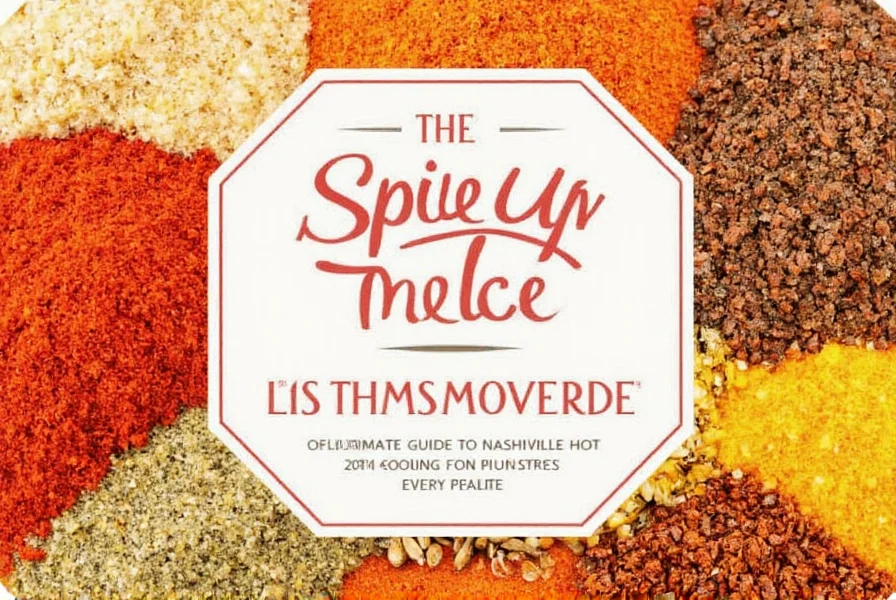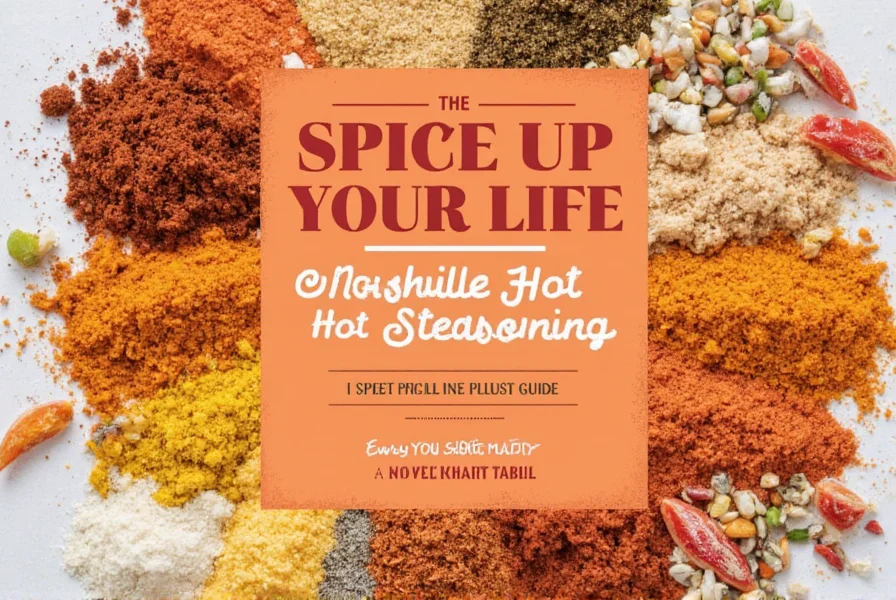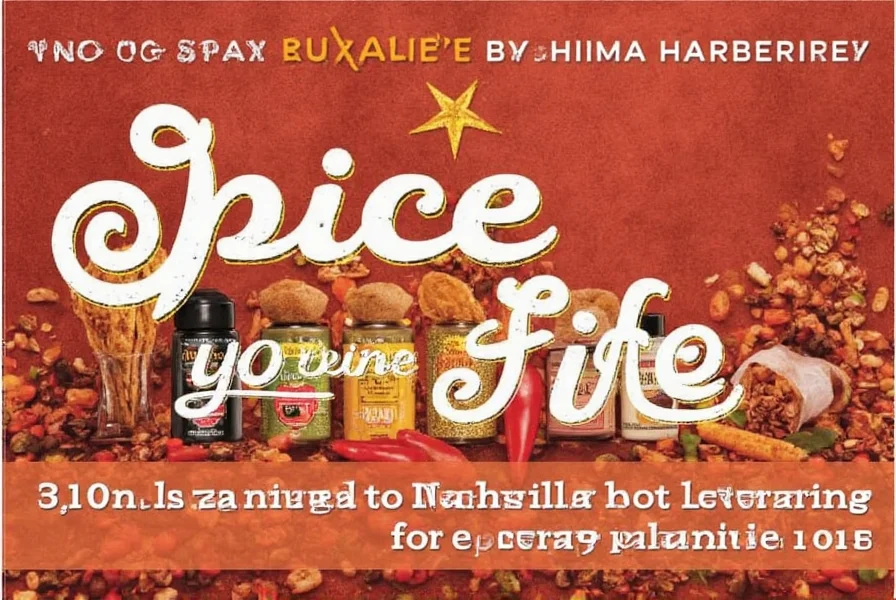What is Nashville Hot Seasoning? The Authentic Southern Spice Explained
Nashville hot seasoning is a distinctive dry spice blend originating from Nashville, Tennessee, specifically created for coating fried chicken at Prince's Hot Chicken Shack in the 1930s. Unlike generic hot sauces, this seasoning features a carefully balanced combination of cayenne pepper, paprika, brown sugar, garlic powder, and other spices to deliver intense heat with complex smoky, sweet, and savory notes.
According to the Nashville Food Project, this seasoning has become a cultural icon representing the city's culinary heritage, with authentic versions requiring specific spice ratios that distinguish them from imitations.

The History of Nashville Hot Seasoning
Created in the 1930s by Andre Prince Jeffries' grandfather at Prince's Hot Chicken Shack, the seasoning was developed as a playful "punishment" for a customer who kept returning to the restaurant. The chef added extra cayenne pepper to the chicken, creating the now-famous spicy dish that eventually became a Nashville staple.
As documented by the Tennessean newspaper, the original recipe was closely guarded for decades before being shared with the public in the 2000s. Today, authentic Nashville hot seasoning requires specific spice ratios that have been preserved through generations of the Prince family.
What's in Nashville Hot Seasoning? Key Ingredients Explained
Authentic Nashville hot seasoning contains these essential components that create its signature flavor profile:
| Ingredient | Quantity | Purpose |
|---|---|---|
| Cayenne Pepper | 2 tbsp | Primary heat source (typically 30,000-50,000 Scoville units) |
| Smoked Paprika | 1 tbsp | Provides deep smokiness and vibrant red color |
| Brown Sugar | 1 tbsp | Balances heat with sweetness and helps create a crispy crust |
| Garlic Powder | 1 tsp | Adds savory complexity and depth |
| Onion Powder | 1 tsp | Enhances umami and rounds out flavors |
| Salt | 1 tsp | Boosts overall flavor perception |
| Dried Mustard | ½ tsp | Provides subtle tanginess that complements the heat |
| Black Pepper | ½ tsp | Earthy undertone that rounds out the spice profile |
According to Cooking Light, the key to authentic Nashville hot seasoning is the precise balance between heat, sweetness, and smokiness. The brown sugar is crucial for creating the signature crispy crust when frying chicken.
How to Use Nashville Hot Seasoning: 7 Pro Chef Techniques
While commonly associated with fried chicken, professional chefs use this versatile seasoning in numerous creative ways. Here are expert-approved applications:
- Classic Fried Chicken: For authentic results, coat chicken pieces in buttermilk, then dredge in flour mixed with 2 tsp of seasoning per cup of flour. Fry at 350°F until golden brown and internal temperature reaches 165°F.
- Grilled Vegetables: Toss zucchini, bell peppers, or cauliflower with 1 tbsp olive oil and 1 tsp seasoning per cup of vegetables. Grill for 10-15 minutes until tender.
- Spicy Popcorn: Melt 2 tbsp butter, mix with 1 tsp seasoning, and drizzle over 6 cups popped popcorn. Toss thoroughly for even coating.
- Shrimp Tacos: Season 1 lb shrimp with 1 tbsp seasoning, then grill or sauté for 2-3 minutes per side. Serve with mango salsa and avocado.
- Mac & Cheese: Add 1 tsp seasoning to cheese sauce before combining with cooked pasta. Top with breadcrumbs for extra texture.
- Roasted Potatoes: Toss 2 lbs cubed potatoes with 2 tbsp olive oil and 1.5 tbsp seasoning. Roast at 425°F for 35-40 minutes until crispy.
- Spicy Butter: Mix 4 tbsp softened butter with 1 tsp seasoning for a quick sauce to drizzle over corn, steak, or seafood.
DIY Nashville Hot Seasoning: Step-by-Step Recipe
Making your own seasoning at home ensures freshness and allows you to customize the heat level. According to Food & Wine, homemade versions often outperform store-bought options when made with fresh, high-quality spices.
| Ingredient | Quantity | Preparation Notes |
|---|---|---|
| Cayenne Pepper | 2 tbsp | Use high-quality cayenne for best heat profile |
| Smoked Paprika | 1 tbsp | Opt for Hungarian smoked paprika for deeper flavor |
| Brown Sugar | 1 tbsp | Light brown sugar works best for balanced sweetness |
| Garlic Powder | 1 tsp | Ensure it's fresh for maximum aroma |
| Onion Powder | 1 tsp | Use dehydrated onion powder, not dried onion flakes |
| Salt | 1 tsp | Kosher salt preferred for even distribution |
| Dried Mustard | ½ tsp | Yellow mustard powder works best |
| Black Pepper | ½ tsp | Coarsely ground for better texture |
Step-by-Step Instructions:
- Combine all ingredients in a medium bowl
- Whisk thoroughly for 1-2 minutes until completely blended
- Transfer to an airtight container
- Store in a cool, dark place away from heat sources
- Shake well before each use to prevent clumping
Pro Tip: For a milder version, reduce cayenne to 1 tbsp and increase smoked paprika to 2 tbsp. For extra heat, add ½ tsp of crushed red pepper flakes.
Buying Guide: How to Choose Authentic Nashville Hot Seasoning
With many commercial options available, knowing what to look for ensures you get an authentic product. According to Epicurious, authentic Nashville hot seasoning should have these characteristics:
| Factor | What to Look For | What to Avoid |
|---|---|---|
| Ingredients List | Simple, recognizable spices with no artificial additives | Fillers like maltodextrin, artificial colors, or anti-caking agents |
| Heat Level | Clear Scoville rating or "mild/medium/hot" labeling | Vague descriptions like "spicy" without specifics |
| Brand History | Brands with direct ties to Nashville or Prince's Hot Chicken Shack | Generic brands with no regional connection |
| Texture | Consistent fine powder without large chunks | Clumpy or uneven texture |
Top 3 Authentic Brands:
| Brand | Authenticity Factors | Best Uses |
|---|---|---|
| Prince's Original Hot Chicken Seasoning | Created by the Prince family who founded the original restaurant; uses the exact recipe from the 1930s | Authentic fried chicken, traditional Nashville hot dishes |
| Butcher & Bee Nashville Hot Blend | Developed by Nashville-based chefs; won "Best Spice Blend" at 2023 Southern Foodways Alliance awards | Grilled meats, vegetables, and innovative recipes |
| Spice House Nashville Hot | Specialty spice company with direct sourcing from Tennessee farms; uses only whole spices ground fresh | DIY recipes, seafood, and vegetarian applications |
Perfect Flavor Pairings for Nashville Hot Seasoning
According to Cooking Channel, the right pairings can elevate Nashville hot seasoning from simply spicy to truly exceptional. Here are professional chef recommendations:
| Category | Best Pairings | Why It Works |
|---|---|---|
| Cooling Agents | Buttermilk ranch, sour cream, coleslaw, cucumber salad | Balances heat while complementing the smoky notes |
| Sweet Elements | Honey, maple syrup, mango, pineapple, peach | Contrasts heat with natural sweetness for complex flavor |
| Acidic Notes | Lemon juice, lime zest, apple cider vinegar, pickles | Cuts through richness and brightens the overall dish |
| Carby Comfort | Biscuits, cornbread, mashed potatoes, white bread | Provides textural contrast and absorbs excess heat |
| Proteins | Chicken, pork shoulder, shrimp, tofu, chickpeas | Spice adheres well to proteins for even flavor distribution |
Pro Tip: For the perfect Nashville hot chicken sandwich, layer spicy chicken with pickles, coleslaw, and a drizzle of honey on a toasted brioche bun.
Myths vs. Reality: Separating Fact from Fiction
Many misconceptions surround Nashville hot seasoning. Here's what culinary experts say about common myths:
| Myth | Reality | Source |
|---|---|---|
| "It's just hot sauce in powder form" | False. Authentic Nashville hot seasoning contains multiple spices beyond chili powder, including brown sugar, mustard, and smoked paprika for complex flavor | Serious Eats |
| "All brands taste the same" | Incorrect. Authentic brands like Prince's have specific spice ratios that differ significantly from generic imitations | Food & Wine |
| "You can only use it on chicken" | Wrong! Professional chefs use it on everything from roasted vegetables to desserts like chocolate truffles | Epicurious |
| "More seasoning equals more flavor" | Not necessarily. Overuse can make dishes bitter; balance is key | Cooking Channel |
Frequently Asked Questions
What's the difference between Nashville hot seasoning and regular hot sauce?
Nashville hot seasoning is a dry spice blend containing cayenne, paprika, brown sugar, garlic powder, and other spices, while hot sauce is a liquid condiment primarily made from chili peppers and vinegar. Seasoning is typically applied before cooking to create a flavorful crust, while hot sauce is added after cooking. According to Cooking Light, the brown sugar in authentic Nashville seasoning creates a crispy texture when fried that hot sauce cannot achieve.
How spicy is authentic Nashville hot seasoning?
Authentic Nashville hot seasoning typically ranges from 15,000-50,000 Scoville Heat Units (SHU), which is medium to very hot. This is significantly hotter than Tabasco sauce (2,500-5,000 SHU) but milder than some habanero-based sauces (100,000-350,000 SHU). The heat is balanced by brown sugar and other spices, creating complex flavor rather than just pure heat. For reference, the original Prince's Hot Chicken Shack uses a proprietary blend that falls in the medium-hot range.
Can I make Nashville hot seasoning less spicy?
Absolutely. To reduce heat while maintaining flavor, decrease the cayenne pepper by 50% and increase smoked paprika and brown sugar proportionally. For commercial blends, mix with additional paprika or breadcrumbs to dilute the heat. Professional chefs recommend pairing with cooling elements like buttermilk ranch or coleslaw to balance the heat without altering the seasoning itself.
How should I store Nashville hot seasoning?
Store both homemade and commercial Nashville hot seasoning in an airtight container away from heat, light, and moisture. A cool, dark pantry is ideal. According to the Spice House, properly stored seasoning maintains peak flavor for 6-12 months. Avoid storing it above the stove or in direct sunlight, as this can cause the spices to lose their potency more quickly. For maximum freshness, consider making small batches every 3-4 months.
Is Nashville hot seasoning gluten-free?
Most Nashville hot seasoning blends are naturally gluten-free, as they consist of pure spices. However, always check labels for potential cross-contamination warnings. When making your own using the recipe provided, ensure all individual spice ingredients are certified gluten-free. The Gluten-Free Society recommends looking for "certified gluten-free" labels if you have celiac disease or severe gluten sensitivity.
What dishes besides chicken work well with Nashville hot seasoning?
Nashville hot seasoning is incredibly versatile! Professional chefs use it on roasted vegetables (especially potatoes and cauliflower), grilled shrimp, popcorn, eggs, mac and cheese, tofu, chickpeas, and even in chocolate desserts for a spicy kick. According to Epicurious, one popular application is mixing it with melted butter for a flavorful topping on cornbread or biscuits. The key is to balance the heat with complementary flavors like sweetness or acidity.
Why Nashville Hot Seasoning Belongs in Your Pantry
Nashville hot seasoning represents more than just heat—it's a cultural icon with a rich history dating back to 1930s Nashville. Unlike generic spicy blends, authentic versions offer complex flavor profiles that transform ordinary dishes into extraordinary culinary experiences.
Whether you're making classic fried chicken, experimenting with new recipes, or simply looking to add depth to your cooking, this seasoning offers versatility that extends far beyond its Southern roots. As culinary experts from Food & Wine note, "The magic of Nashville hot seasoning lies in its perfect balance of heat, sweetness, and smokiness, creating a flavor experience that's more than the sum of its parts."

Start experimenting today—try it on roasted vegetables, seafood, or even in your next batch of mac and cheese. With the right balance and pairing, Nashville hot seasoning can elevate your cooking to new heights.











 浙公网安备
33010002000092号
浙公网安备
33010002000092号 浙B2-20120091-4
浙B2-20120091-4